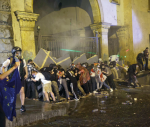You are here
Why there is no Intifada in Palestine
Apr 29,2015 - Last updated at Apr 29,2015
Instead of a broad uprising, there are only isolated cases where young Palestinians attack Israeli soldiers or settlers with whatever comes to hand, episodes that do not seem to worry either side very much.
On the Palestinian side, a family grieves when their young folk are killed during or following an attack, but the Palestinian authorities do nothing.
On the Israeli side, a fatality also means mourning, but by contrast, there is action by the security forces, sometimes violent, other times involving curfews and blockades.
The latest incident on Jerusalem’s Mount of Olives was an example of what is happening and what is likely to happen.
A 17-year-old boy, Mohammad Said Abu Ghanam, was shot dead by Israeli troops manning a checkpoint following an altercation with a Druze soldier who insulted the boy’s sister.
The youngsters were returning home after an outing. A resident of the area said that Druze and bedouin Israeli soldiers are often nasty to Palestinian girls.
Mohammad’s body was delivered to the family for burial at two in the morning. About 2,000 people turned out for the funeral, shouting “Allahu akhbar” and “Shahid”.
My source said the boy used to deliver fresh milk from his father’s four cows to households.
Individual incidents like this have been called the “lone wolf Intifada”. The result is rising death and injury rates.
Last year saw the highest number of Palestinian fatalities involving Israelis since 2007 and highest number of injuries since 2005.
The violence peaked after the killing of three Israeli youths in June and the retaliatory
slaying by Israelis of a Palestinian teen.
Jerusalem think tank director, Dr Mahdi Abdul Hadi, said the Israelis see Palestinians as “the enemy” and “shoot to kill. They take it for granted that they will be absolved [of responsibility]. Palestinian youths are left on their own and dehumanised. They react.”
In 2014, outside Gaza there were 105 Palestinian and 87 Israeli casualties, compared to 39 Israeli and 92 Palestinian casualties in 2013.
The dramatic rise in Israeli casualties is striking and could account for increased Israeli use of live fire.
The monthly average for Palestinians held for security reasons increased by 24 per cent, but the monthly average for placing children in custody decreased marginally to 185 in 2014, compared to 197 in 2013.
Finally, the number of people in administrative detention increased to 327 in 2014 from 132 in 2013.
These numbers mean that the “lone wolf Intifada” is deadly, although not as deadly as the second, the Intifada of guns and bombs, or the first, the Intifada of the stones.
These kinds of Intifadas are now out of the question for several reasons. First and foremost, stated Jeff Halper, an Israeli peace activist, Israel has divided the occupied Palestinian territories into tight enclaves that cannot physically communicate with each other due to the wall-and-fence-complex and checkpoints.
The Israeli army is everywhere and there are many Palestinians who collaborate with the Israeli domestic intelligence service.
Israeli army squads pose as Palestinians, enter Palestinian towns and villages at will and arrest and shoot Palestinians. Israeli and Palestinian Authority intelligence and police forces cooperate, both seeking to prevent an explosion.
“Nothing is unknown,” stated Halper, “thanks to surveillance by satellites, drones and balloons.”
He pointed out that 43 top intelligence operatives serving in Unit 8-20 quit because they objected to the fact that their work intruded into the private lives of Palestinians.
Halper compared the Palestinian situation to that of prisoners in US jails who are “warehoused” or face “static imprisonment”. They go neither forward nor backward, but are simply locked away and excluded from society.
Palestinian sources pointed out that there can be no Intifada without leadership, and the current Palestinian leadership simply does not want an uprising even though there is no prospect of progress through negotiations.
Former Palestinian foreign minister Nabil Shaath said there will be no progress as long as Benjamin Netanyahu heads the Israeli government.
“There will be no political peace and no economic peace. Oslo is dead... the talks chaperoned by the Americans are dead.”
Indeed, Oslo was a Trojan horse that led to the Israeli take over 62 per cent of the land of the West Bank, 92 per cent of the water and 100 per cent of its minerals. They control all access and movement.
“The only option is nonviolent resistance modelled on the campaign led by Nelson Mandela” in South Africa.”
The Palestinian “vision must be an anti-apartheid struggle [that] will put pressure on the Israelis to change their policies and make them think peace is better than occupation.”
Ghassan Khatib, vice president for advancement and fundraising at Bir Zeit University, said the Palestinians have so far passed through two stages, the armed struggle and bilateral negotiations, and are now focusing on internationalisation through the UN, International Criminal Court (ICC), international law and the boycott, divestment and sanctions campaign. BDS has, at long last, been adopted by the Central Committee of the Palestine Liberation Organisation under grass-roots pressure.
Said Khatib: “Israel is not leaving us any choice.”
It has refused to progress in bilateral negotiations.
“Left on their own, Israelis and Palestinians will not move. Israel will use its strength to impose things unilaterally. The only thing we can do is go to the ICC and Security Council.”
Halper pointed out that there is, however, another weapon the Palestinians need to build upon and use: “the large reservoir of sympathy [for their cause] in the world”.
In his view, if the Palestinians make an all out effort to use global public opinion, they could put serious pressure on Israel to come to terms with them.
“Israel thinks it’s won, it’s over.”
It is up to the Palestinians to make certain, the struggle for Palestine is not over and to achieve this monumental task without an Intifada.













